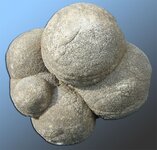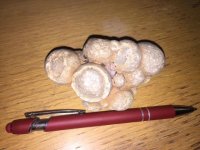You are using an out of date browser. It may not display this or other websites correctly.
You should upgrade or use an alternative browser.
You should upgrade or use an alternative browser.
Bubbles?
- Thread starter polypteruswithwings
- Start date
-
- Tags
- bubbles identification
flinthunter
Hero Member
- Jan 3, 2011
- 899
- 1,074
- Detector(s) used
- E-Trac, V3i, DFX
- Primary Interest:
- All Treasure Hunting
Not sure, but they could be chert nodules.
Upvote
0
Joe hunter
Bronze Member
- Mar 2, 2013
- 2,159
- 1,896
- Detector(s) used
- Xp Deus ,
- Primary Interest:
- All Treasure Hunting
Looks like petrified puff balls
Upvote
0
BigDadddy
Jr. Member
Can you do some tests, hardness, streak, etc..? I have seen fossilized eggs look like that. Color can change based on surroundings. https://images.app.goo.gl/2pHiYDLmXCNjCHFE8
Upvote
0
GoldieLocks
Bronze Member
dino eggs that got replaced with minerals over time? Or Wild mushrooms replaced the same way too.
Upvote
0
Red-Coat
Gold Member
If those were dino-eggs (or any kind of eggs) the clutch would consist of similar sizes, which those obviously aren't. Mushroom fossils of any kind are exceptionally rare because mushrooms and other fungi are primarily water with very little 'hard' tissue capable of generating replacement fossils.
The interior shows that they are concretionary in nature and there's no reason to suppose they are fossils, except that fragmentary organic debris (small pieces of shells, plants etc) often act as a nucleus around which concretions form. Since concretions are formed by successive precipitation of minerals around the nucleus, it's not uncommon for them to grow at different rates and ultimately a group of concretions may encroach upon one another to form conjoined clusters... like this:

They commonly erode out of sedimentary rocks - especially sandstones, siltstones and mudstones through which iron-rich groundwater has percolated. They're most commonly silica-cemented, but sometimes calcite-cemented and often harder than their host rocks such that they are all that is left behind after the rock has eroded or weathered.
The interior shows that they are concretionary in nature and there's no reason to suppose they are fossils, except that fragmentary organic debris (small pieces of shells, plants etc) often act as a nucleus around which concretions form. Since concretions are formed by successive precipitation of minerals around the nucleus, it's not uncommon for them to grow at different rates and ultimately a group of concretions may encroach upon one another to form conjoined clusters... like this:

They commonly erode out of sedimentary rocks - especially sandstones, siltstones and mudstones through which iron-rich groundwater has percolated. They're most commonly silica-cemented, but sometimes calcite-cemented and often harder than their host rocks such that they are all that is left behind after the rock has eroded or weathered.
Upvote
0
Top Member Reactions
-
 2576
2576 -
 1154
1154 -
 1071
1071 -
 895
895 -
 857
857 -
 854
854 -
 784
784 -
 693
693 -
 631
631 -
 575
575 -
 488
488 -
 478
478 -
 471
471 -
 464
464 -
 457
457 -
 428
428 -
O
422
-
 391
391 -
 381
381 -
 356
356
Users who are viewing this thread
Total: 2 (members: 0, guests: 2)
Latest Discussions
-
-
-
-
-
Semi-Retirement gift to myself.... New Manticore for $1199
- Latest: TheInspector



